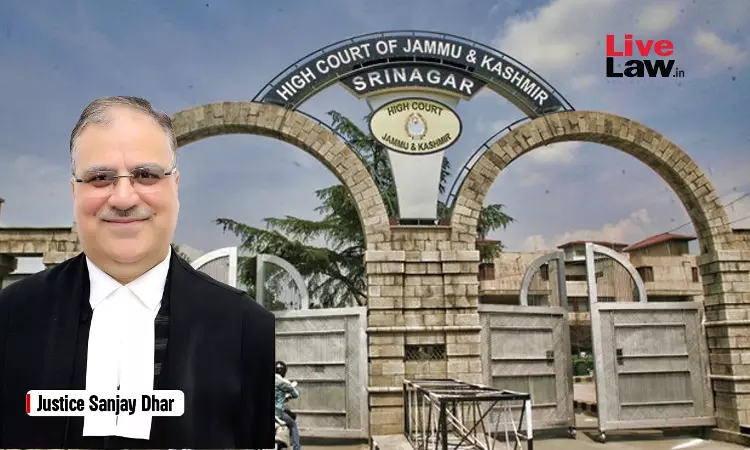- Home
- /
- High Courts
- /
- High Court of J & K and Ladakh
- /
- Incomplete Disclosure Of Material...
Incomplete Disclosure Of Material Facts To Superintendent Of Police Not Strict Compliance With S.154 CrPC: J&K High Court
Aleem Syeed
10 April 2025 9:00 PM IST
The Jammu and Kashmir High Court has held that not disclosing the material facts to the superintendent of police or annexing the duly sworn affidavit of the person who had made an oral complaint does not demonstrate strict compliance with section 154 CrPC for the purpose of invoking the jurisdiction of the court under section 156(3) CrPC.The petitioner had challenged the order passed by...
The Jammu and Kashmir High Court has held that not disclosing the material facts to the superintendent of police or annexing the duly sworn affidavit of the person who had made an oral complaint does not demonstrate strict compliance with section 154 CrPC for the purpose of invoking the jurisdiction of the court under section 156(3) CrPC.
The petitioner had challenged the order passed by the Sessions Court under section 156(3) for the registration of FIR on the ground that the order was passed without strictly following the mandate under section 154 Crpc.
Justice Sanjay Dhar said that no mention of allegations regarding the illegal confinement of the complainant or illegal confinement of his father-in-law, nor was there any mention of beating up and dragging of the complainant by the petitioners mentioned in the complaint filed before the Superintendent of the police.
The court said that no material facts which form part of the complaint made before the magistrate were disclosed in the complaint made to the superintendent of police for taking action, which clearly shows that requirements of section 154(3) were not strictly adhered.
The court also said that where an oral complaint is made to the concerned police station by the aggrieved, such person has to file a duly sworn affidavit and annex the same with the application filed under section 156(3) for the purpose of showing compliance with the section 154(1) Crpc.
The court noted the averments of the respondent-complainant, stating that her elder sister had gone to the concerned police station to file the complaint; however, the police officer refused to file the said complaint.
The court said that instead of annexing the sworn affidavit of his sister who had gone to police station, the applicant had placed his own affidavit with the application and in absence of any other document proving that complaint was initially made, the requirements of section 154(1) cannot be said to have been complied with.
The court also took note of the fact that the said complaints were made only after the period of seven months after the said alleged incident and that too when the petitioner filed the complaint against the respondent for the recovery of the money under the Negotiable Instruments Act.
The court said that the revisional court which passed the 156(3) order in favour of the respondent had without basis observed that the complainant could not file the complaint earlier before SSP because at the time he was under illegal confinement and subsequently was arrested and that only after his release on bail, the complaint was filed.
The court said that he had ample time at his disposal to move the machinery of the police as well as the Magistrate and the observation to the effect that he could not file a complaint due to illegal confinement and subsequent arrest is nothing but a figment of imagination.
BACKGROUND
The petitioners have challenged the order passed by the Principal Sessions Judge, Jammu, whereby a revision petition filed against the order passed by the Trial Magistrate was allowed, and the SHO was directed to register an FIR on the basis of the complaint filed by respondent No. 2 against the petitioners.
The said complaint on the basis of which the direction was passed by the revisional/sessions court had alleged the commission of 120-B, 193, 195/408, 196, 209, 211, 323, 420 IPC etc
The complainant/ respondent had initially filed the complaint under above section with the magistrate who had dismissed the application after seeking the report from the concerned SSP on the grounds that the respondent/complainant has not complied with the requirement of approaching the incharge of the Police Station concerned and the SSP before filing the complaint before the court.
The order was challenged before the revisional court directed the lodging of FIR, citing that the complainant had specifically stated in his complaint that his elder sister had approached the SHO concerned, and he had also placed on record the complaint addressed by his wife and brother-in-law to SSP Jammu.
In the instant petition, the petitioner has again challenged the order of the sessions court for the non-compliance of section 154 for seeking remedy under 156(3)
APPEARANCE:
Himanshu Beotra, Advocate For Petitioner
P. D. Singh, Dy.AG and Bhavesh Bhushan, Adv. For Respondents
Case-Title: Anil Gupta and another vs Union Territory of J&K and another
Citation: 2025 LiveLaw (JKL) 144
Click Here To Read/Download Order



